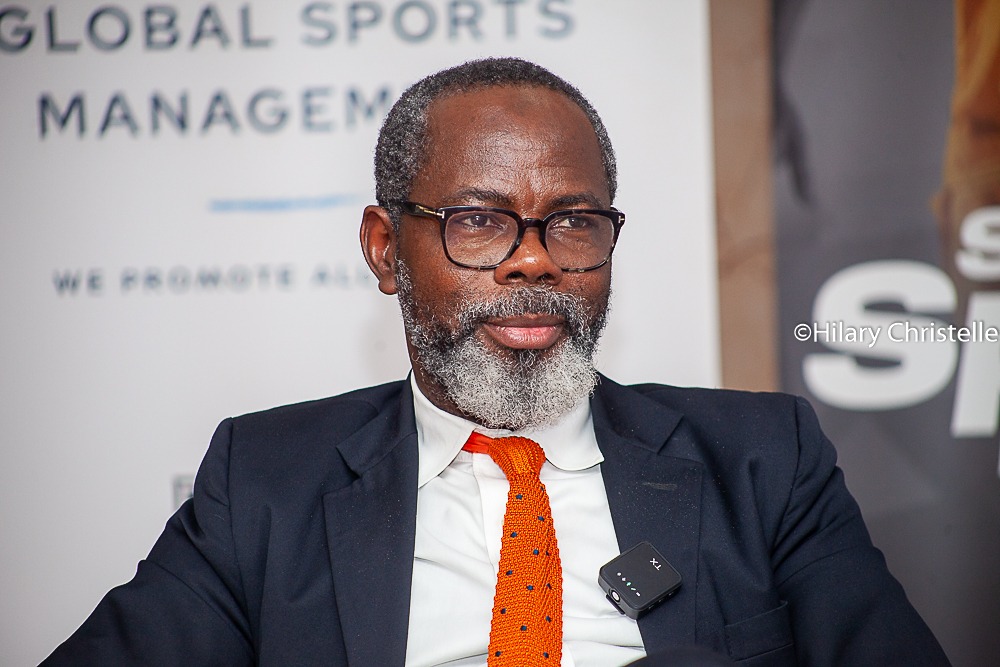Beninese Sports Fair: Mahama Coulibaly- “Sponsorship is not philanthropy”

Photo Credit: Hilary Christelle Tolo Kpadonou
Beninese Sports Fair: Mahama Coulibaly- “Sponsorship is not philanthropy”
EDITOR NOTE: This article is translated from the original written in French by Hilary Christelle Tolo Kpadonou for Pan-Africa Football.
Cotonou hosted the first edition of the Beninese Sports Fair on April 3, 2025. It was a two-day exchange workshop that brought together not only all stakeholders involved in the Beninese sports ecosystem but also experts from Côte d’Ivoire.
The objective of the fair, according to its initiator, Fawaz Adjibadé, through his agency Global Sport Management, is to “bring together all stakeholders in Beninese sports to discuss the mechanisms that need to be put in place to develop Beninese sports in the years to come.”
A total of nine topics were discussed during the conference. These included the development and promotion of women in sports: What plan is there for the feminization of women within sports organizations? The institutional and legal framework for sport and the sports economy in Benin; Developing sporting excellence among young people: What approach should be taken for school sports programs and projects and training centers; and sponsorship and partnerships in the sports economy: How to attract and retain sponsors.
Regarding the last point, Ivorian sports business expert Mahama Coulibaly shed light on the realities of sports financing in Africa and the strategies to adopt to attract and retain sponsors.
Africa: “80% of sports funding relies on public subsidies. “Clubs rely heavily on public subsidies, which represent between 80% and 90% of their funding.”
Faced with this reality, sponsorship appears to be a credible alternative but opportunities must be seized. Other sources such as ticketing, merchandising, and television rights also constitute means of financing sports. Television rights “represent a key factor in increasing audiences and sponsorship,” but he also points out that: “TV doesn’t go to the stadium when the public isn’t there. Otherwise, it’s an investment that results in a loss.”
Why do some African countries attract more sponsors?
South Africa and Morocco are cited as success stories. In South Africa the existence of private club owners, the structuring of competitions and the policy of developing sports as a tourist attraction have helped build an attractive ecosystem.
Morocco is following the same dynamic, with full stadiums and a well-established sports consumption culture. In Nigeria, large local companies are investing heavily in sports. “There are very patriotic, billionaire companies who contribute to sports which are quite important.”
Ivory Coast, for its part, has benefited from the momentum of hosting the 2023 Africa Cup of Nations to develop its attractiveness, notably through solid partnerships with telecommunications companies and sports equipment manufacturers. “It is thanks to these strategies that Ivory Coast is today at the top of African basketball,” explains Coulibaly, who himself played a major role in the structuring of this discipline, as president of the federation.
The keys to attracting sponsors
How do you convince a company to invest in sports? According to Coulibaly, several factors are crucial:
Events: A strategic lever
Coulibaly recommends that federations adopt a modern marketing approach and target a broader, more passionate audience. “70% of the audience at a sporting event is made up of people outside the sport.” They are the ones who create value, who consume, who buy tickets and derivative products.
He also emphasized the need for federations and clubs to become more professional. Too often, decisions are made by enthusiasts without any real economic expertise. It’s necessary to surround yourself with specialized firms, consultants, and private sector professionals who know how to attract investment.
The message is clear: the development of sport in Africa will require better structuring and a business approach that places sport at the heart of the economy.
Hilary Christelle Tolo Kpadonou